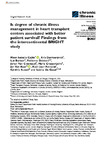Is degree of chronic illness management in heart transplant centers associated with better patient survival?: findings from the intercontinental BRIGHT study

Ver/
Use este enlace para citar
http://hdl.handle.net/2183/28571
A non ser que se indique outra cousa, a licenza do ítem descríbese como Creative Commons Attribution-NonCommercial 4.0 International License (CC-BY-NC 4.0)
Coleccións
- Investigación (FCS) [1293]
Metadatos
Mostrar o rexistro completo do ítemTítulo
Is degree of chronic illness management in heart transplant centers associated with better patient survival?: findings from the intercontinental BRIGHT studyAutor(es)
Data
2021-09-22Cita bibliográfica
Cajita MI, Denhaerynck K, Berben L, Dobbels F, Van Cleemput J, Crespo-Leiro M, Van Keer J, Poncelet AJ, Russell C, De Geest S. Is degree of chronic illness management in heart transplant centers associated with better patient survival? Findings from the intercontinental BRIGHT study. Chronic Illn. 2022 Dec;18(4):806-817.
Resumo
[Abstract] Purpose: To explore the association between the degree of Chronic illness management and survival rates at 1-, 3-, 5-years post heart transplantation.
Methods: Exploratory secondary analysis of a cross-sectional, international study (Building Research Initiative Group study). Latent profile analysis was performed to classify 36 heart transplant centers according to the degree of chronic illness management.
Results: The analysis resulted in 2 classes with 29 centers classified as "low-degree chronic illness management" and 7 centers as "high-degree chronic illness management". After 1-year posttransplantation, the high-degree chronic illness management class had a significantly greater mean survival rate compared to the low-degree chronic illness management class (88.4% vs 84.2%, p = 0.045) and the difference had a medium effect size (η2 = .06). No difference in survival for the other time points was observed. Patients in high-degree chronic illness management centers had 52% lower odds of moderate to severe drinking (95% confidence interval .30-.78, p = 0.003). No significant associations between degree of chronic illness management and the other recommended health behaviors were observed.
Conclusions: The findings from this exploratory study offer preliminary insight into a system-level pathway (chronic illness management) for improving outcomes for heart transplant recipients. The signals observed in our data support further investigation into the effectiveness of chronic illness management-based interventions in heart transplant follow-up care.
Palabras chave
Chronic illness management
Heart transplant
Latent profile analysis
Patient outcomes
Survival
Heart transplant
Latent profile analysis
Patient outcomes
Survival
Versión do editor
Dereitos
Creative Commons Attribution-NonCommercial 4.0 International License (CC-BY-NC 4.0)
ISSN
1742-3953






